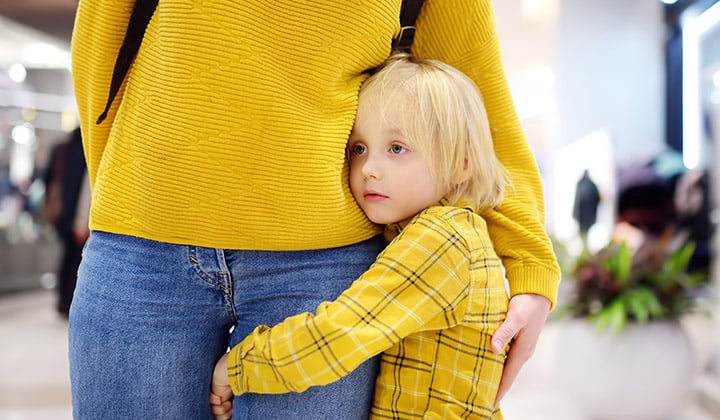Get updates
Have a parenting hack to share? Or a topic you'd like to see?
Helping kids through separation anxiety

It’s normal for young kids to feel nervous when they leave their parents. But sometimes, those feelings are stronger and last longer and keep kids from doing routine and fun things like attending school, participating in activities or playing sports. That’s called separation anxiety. It can be hard for both kids and parents, but there are ways to help.
What does separation anxiety look like?
Kids with separation anxiety may:
- Cry or have tantrums when a parent leaves.
- Refuse to go to school or daycare.
- Ask lots of “what if” questions before anticipated separation.
- Worry something bad will happen to them or their parent.
- Say they feel sick, like having a stomachache or headache.
- Have nightmares about being apart.
Some kids are clingy and have trouble separating from parents at times, but most kids adjust over time. If the worry lasts longer than 4 weeks and makes daily life hard, it might be more than just a phase.
When is it normal, and when should parents be concerned?
It’s common for kids under 6 to feel nervous about being apart from their parents. For kids of all ages, if the worry keeps them from going to school, playing with friends or doing fun things, it may be time to get help.
How can parents support their child?
Avoiding scary things can make fear worse. Instead, help your child face their fears step by step. Some ideas to try include:
- Praise them when they try something hard or that scares them.
- Use a reward chart or give stickers for brave behavior.
- Make a “ladder” of small steps to reach a big goal, like the steps from entering school holding a parent’s hand all the way until they can do it on their own.
- Keep routines the same every day.
- Stay calm during tough moments.
- Use grounding tricks like naming things they see or hear (e.g., tell me everything you see that is blue!).
- Provide support without reinforcing anxiety by saying things like, “It sounds like you’re worried, and you’re really brave. I know you can do this!”
If your child asks the same question over and over, try the “asked and answered” method. Answer once, then gently remind them you’ve already answered. When they change the topic, give them your full attention.
How can parents help with big changes like starting school?
Before a big change, work with teachers or daycare staff. Let them know your child might need extra support. You can:
- Visit the new place together.
- Talk about fun things they’ll do there.
- Give your child a special job or role with support of their teachers.
- Practice coping skills like deep breathing or finding shapes in the room.
- Set a “worry clock” where they can ask questions and express worries for a set amount of time; once the clock is up, provide them positive reinforcement for moving on!
How do parents’ feelings affect their kids?
Kids notice how their parents feel. If you’re anxious, your child might feel more anxious, too. Try to stay calm and confident. If you’re having a hard time, it’s OK to ask for help for yourself.
Be careful about how you talk about new places or events. It's OK for adults to say they're scared or worried about something, and this can even help normalize feelings of anxiety. Children may pick up on how much time parents spend talking about anxiety or how parents process their fears (i.e., such as avoiding tasks or asking repeated questions). If your child exhibits some of these behaviors, it may be worth exploring further.
Does separation anxiety look different in older kids?
It can. Younger kids may say they feel sick or refuse to go to school. Older kids may worry about accidents or not seeing their parents again. Use the same support strategies but adjust your words to fit your child’s age.
When should parents get professional help?
If your child’s anxiety lasts more than 4 weeks and makes life hard for them or your family, talk to your child’s doctor. They can help you find a counselor who works with kids and knows how to treat anxiety. This may look like:
- Teaching parents how to support their child.
- Helping kids learn ways to manage their worries.
- Using rewards and small steps to build confidence.
School counselors can also help if your child is avoiding school.
Can separation anxiety appear like something else?
Yes. Some kids act out or seem defiant, but they may really be scared. Try to name the feeling, not label your child. Say, “You’re feeling anxious,” instead of “You’re anxious.” This helps kids understand and manage their emotions.
Praise your child when they do something well. Staying calm and neutral helps, too. Kids often copy how their parents act, so your calm can help them feel safe.
Remember, you are not alone. Many parents face these challenges, and with patience and support, your child can learn to feel safe and confident even when you're apart. Keep showing up, keep encouraging and reach out for help when you need it.
Additional Resources:
- Breaking Free of Child Anxiety & OCD: A Scientifically Proven Program for Parents
- Helping Your Anxious Child: A Step-by-Step Guide for Parents
- Freeing Your Child from Anxiety, Revised and Updated Edition: Practical Strategies to Overcome Fears, Worries, and Phobias and Be Prepared for Life--from Toddlers to Teens
